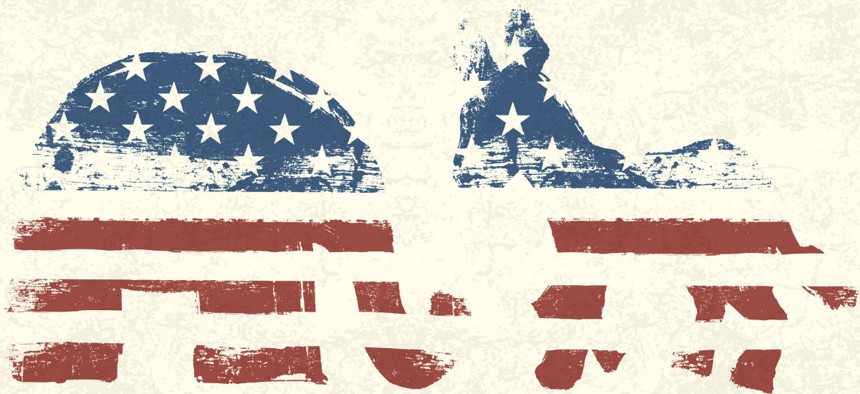
pashabo / Shutterstock.com
What's Behind the Recent Political Upheaval?
Ideology, populism, and a hatred of you-know-who.
Normally, the hopes and fears of the two major political parties are roughly symmetric. If one party is worried or pessimistic, the other party is usually hopeful or optimistic. There are occasional exceptions—say, if one side is increasingly optimistic about an election while the opposition is in denial or even delusional; they should be worried but aren’t.
None of that is the case now. This is one of the few times when the leaders, top strategists, and establishments of both parties are panicky, and for good reason. Democrats are understandably worried that their long-time front-runner for the presidential nomination, Hillary Clinton, is falling behind Sen. Bernie Sanders of Vermont in the crucial states of Iowa and New Hampshire. Nationally, Sanders’s support is growing while, in virtually every opinion poll you look at, Clinton’s numbers are softening if not sinking like a stone. Her leads against possible Republican opponents, once strong, are now gone.
At the same time, it would be daunting to find a party leader or a strategist not on Sanders’s payroll who thinks the self-described Democratic socialist is a plausible victor in a general election. Clinton isn’t necessarily the only Democrat who could win a presidential race in 2016, but the candidate who now has the momentum isn’t a good bet to capture 217 electoral votes.
Conversely, Republican leaders and strategists are equally petrified at the prospect of either Donald Trump or Ben Carson as their nominee. The two nonpoliticians are running first and second in just about every poll, and every candidate who has a realistic chance to win a general election is far behind, in single digits or just above.
Some of the best minds in both parties are now questioning their own competence, wondering whether they are losing their touch, having missed an upheaval in American politics.
What explains it? I would point to three things, in combination: ideology, populism, and an angry-outsider, antiestablishment dynamic.
It isn’t news that the Democratic Party is moving to the left while the Republican Party is moving to the right. Still, consider how much more liberal the Democratic Party is today than in 2001, when Bill (and Hillary) Clinton left the White House. Symmetrically, the Republican Party has become far more conservative than when George W. Bush’s tenure ended in 2009. Not only has each party’s center of gravity moved toward the extreme; the ideological spans of parties no longer overlap. Vote ratings for members of Congress show that not a single Democrat is more conservative than any Republican (and, necessarily, vice versa—no Republican is more liberal than any Democrat).
Even among voters, liberal Republicans and conservative Democrats are virtually extinct, while moderates have lost their voice and influence. Some of these estranged partisans have given up and now identify as independents. Others remain nominally in their party but are no longer activists, whether as candidates, donors, precinct captains, or door-to-door canvassers. As the two parties have become ideologically more cohesive, centrist or moderate candidates—of the sort that both parties’ establishments have traditionally embraced—are bound to lose in primary elections, if they run at all.
A second factor that is fueling this upheaval in American politics is the populism on the rise within each party and nationwide. Strong feelings are bubbling up from below. Just as the Occupy Wall Street movement led to the canonization of Sen. Elizabeth Warren of Massachusetts and the success of Sanders in her stead, the grassroots tea-party movement made possible the surge of Trump and Carson—interestingly, a billionaire and a retired neurosurgeon. In both parties, big institutions are now suspect and wield less clout.
Overshadowing everything is the anger toward Washington and career politicians that has profoundly affected the races on both sides. Most acutely, it has hurt Clinton and Jeb Bush, the dynastic candidates. We now have a “Scarlet P”—calling someone a politician has become as slanderous a slur as there is. Among voters in both parties, the prevailing emotion seems to be: How could a Trump, a Carson, or a Sanders do worse than politicians of the past? While Sanders has been in elective office for all but two of the past 34 years—as mayor of Burlington, as a congressman, and now as a senator—he is seen as something different from a politician. Being impolitic helps.
Where all of this is going and which side should be more petrified is absolutely unknowable. We are at a point where a knowledge of political history and an understanding of what usually happens in a given situation are useless. The expectation has been that these insurgents will soar high and then collapse, like Howard Dean, Michele Bachmann, and Herman Cain before them. That remains a decent guess, but it is only a guess. Nobody really knows anything.
(Image via pashabo / Shutterstock.com)






